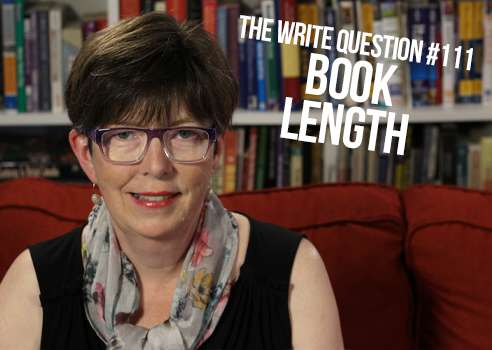Viewing time: 4 mins. 55 secs.
The Write Question is a weekly video podcast about writing that I started in 2017 and that ran, more or less weekly, until April 2022. This is a republication of issue #111, which gives advice on how long your book should be. The post first ran on Oct. 11/19.
Transcript:
Have you ever tried to figure out how long your book should be? That’s the topic I’m addressing today in The Write Question. I’m Daphne Gray-Grant, the Publication Coach.
Here’s a question from Madeline Anderson, a writer based in Washington, DC. Here’s what she wrote in her email to me:
“I’m working on a book, a political thriller. So far, I have about 50,000 words and I wonder how many more I need to write. What are the typical word counts for books and what are the expectations of agents and publishers?”
Thanks for the question, Madeline. While many of us might steel ourselves to perform the boring work of counting the number of words in a magazine article, none of us would bother to do it for a book. Way too big a job!
Nevertheless, agents and publishers work with very specific word counts in mind and if you vastly exceed them OR vastly fail to meet them, your book will not get very far.
The magic number you need to know is 80,000 words. That’s the accepted “average” for most books unless you’re writing science fiction or fantasy (I’ll get into those in a moment.)
Now, you can go a little longer if you like, say 90,000 words. And you can go a little shorter, too. My new book, Your Happy First Draft, is roughly 70,000 words.
But if you’re dramatically higher or lower than 80,000 words, publishers and agents are going to look askance at you.
If your manuscript is too short, they’ll think you’ve deprived your readers and not given them enough story or information.
If your manuscript is too long, they’ll think you haven’t done enough editing. And guess what? They’ll probably be right.
Now, of course, there are exceptions. For example, on the short end of the range, there is Ian McEwan’s On Chesil Beach, which was only 40,000 words. But he won the Booker Prize before he wrote that one, and, besides, many people would call it a novella rather than a novel.
And on the long end, there is Leo Tolstoy’s War and Peace, which was 587,287 words.
But keep in mind that both McEwan now and Tolstoy in his day were famous writers. If you’re a famous writer, you might have the chance to rewrite the rule book. But you won’t get that chance if you’re a new writer.
People often wrongly think that J. K. Rowling somehow escaped these rules. But she didn’t! At least not until she became famous herself.
Her first book, Harry Potter and the Sorcerer’s Stone, was 76,944 words, exactly within the range I’ve described. Her second book, Harry Potter and the Chamber of Secrets, was a little longer. But at 85,141 words, was still within the required range.
She didn’t go really crazy until her 5th book, Harry Potter and the Order of the Phoenix. And that one was 257,045 words. But she was one of the most famous bestselling authors in history at that point.
By the way, I’ve provided links to all the books I’ve mentioned below.
Now, as promised, let me address the category of Sci-Fi and Fantasy. This genre runs long, probably because the writers need to create alternative universes and this work requires more words. Still, you don’t want to go too much longer. The recommended length is 100,000 to 115,000 words.
Keep in mind, whatever your genre, publishers and agents really don’t want you to go too long. It creates more work for them; it makes printing more expensive, and it suggests, however mildly, that you have not done sufficient editing yourself.
Finally, let me wrap up with a quote from the writer, Nobel laureate and Holocaust survivor Elie Wiesel: “Writing is not like painting where you add. It is not what you put on the canvas that the reader sees. Writing is more like a sculpture where you remove, you eliminate in order to make the work visible.“
Madeline, it sounds as though you have only 20,000 to 30,000 more words left to write. Sketch out where you are with your plot. If you’re not at roughly the 60% point of your story, you’re likely going to have a problem on your hands. See if there are some plot points you can tighten or characters you can cut. And congratulations on getting as far as you have already.
Links
Harry Potter and the Sorcerer’s Stone


